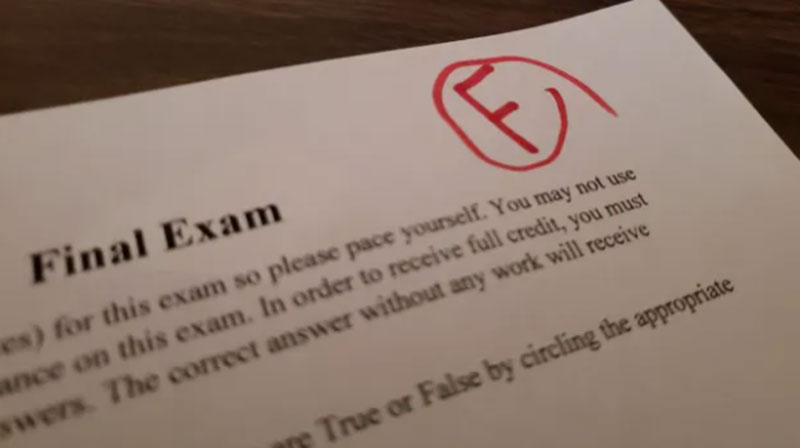Suppose you are a college student and you fail a class. Well, the feeling is not very pleasant. But, in actuality, it is not the end of the world. You can raise your GPA by retaking the failed courses. You can always try to come back and do better, to produce something that will be worthy of your talent.

If you discover that you are failing or if you have failed already, some of the following things might happen:
Firstly, your cumulative GPA might go down. You have to keep your GPA high for you to qualify for all the scholarships or honor programs you meet for. This seems to alert institutions and scholarship committees that your academic performance may be deteriorating. Although there are numerous scholarships and academic content that require high indicators of GPA as guidelines for competence and consistency.
Secondly, your graduation may be delayed. Failing a class as an undergraduate can definitely hurt your chances of getting admitted to graduate school. Academic records are highly relevant when it comes to graduate admission, and this is why it is advisable to perform well. When a student gets a failing grade, he or she will have questions raised concerning the creditworthiness of pursuing higher levels of learning.
Thirdly, you will have to take the class again. To take a course again means to learn the same materials all over again and spend extra time with the subject, but sometimes it helps to minimize the consequences of failing. It’s probably even beneficial for you to seek a talk with your professor or advisor so as to do better next time you take this class. However, do not assume that you can retake a class because not all colleges offer this option, and even when they do, it may only apply to some courses.
Last but not least, failing a class can be a blow to your self-esteem and motivation. It's important to remove any negative feelings and seek support from friends, family, or campus counseling services.
Failing a college class can be an uncomfortable experience, but it's important to approach it as a learning opportunity rather than a setback.
Research at Ohio State University has shown that around 10% of undergraduates redo failed courses each year. So, failing classes at college is quite common. Failing a class is not as big a deal. However, it may make things worse and reduce your motivation to work harder and do better in your studies. You should not panic over a failing grade because it happens more often than you can imagine. However, as long as you clear the wreckage, it will not cause you to fail to graduate. Also, if you are a freshman, you will be able to use the internet to find tips that will help you prepare for your freshman year of college.
The first step that you should take when faced with this kind of question is to consult with your teacher. Request to meet them during their office hours or arrange to set up an individual appointment time. You should be able to ask your professor to explain their grading breakdown if they do not clearly state or provide one. It will help you determine at which point you are wrong and which areas you’d better work on.
If possible, talk with the teacher to see if there are things that you can do to increase your grade. These measures may include writing another essay, seeking to get extra credits, or doing an alternate assignment.
Based on your school's rules and regulations, you may be allowed to take a course or section and thereby be given an “incomplete” instead of a “fail.” This option will give you some more time to do your remaining work or sit for the test.
Asking for constructive feedback is safe, as it will not be taken personally but used to improve future performance. If you will revisit the course, then it is wise because it means that you came to explore and that even your errors were important to learn.
In this case, after talking to your professor, it is advisable to consult your academic advisor. Your advisor will explain how you are behind in the course and how it will impact the other classes you are taking, as well as what adjustments may need to be made to your class schedule. Besides, find out your school’s policies on repeating a course and how the new grade will be counted on your credit and GPA calculations.
Your advisor could suggest tutoring services, study groups, or any other activities with which you could do well in the future.

As mentioned above, most schools have policies in place that allow students to get credit for specific classes if they didn’t perform well on the first attempt. This policy enables the learner to repeat a class and have a better GPA than the previous one by doing the class again and getting a pass instead of a fail.
To improve the GPA score, you can redo a subject and get a better mark. This may be helpful to reinforce the information and improve your own understanding of the subject. However, it should be noted that every school has particular policies concerning the chances of retaking the class. Also to keep in mind is the aspect of having to pay tuition fees each time one has to repeat a certain course, which will definitely increase the total cost of education.
Several factors contribute to this contentious issue; therefore, it may be advisable to seek academic guidance before repeating a course. They can advise you on how this retaking works in your course sequence, tell you about any potentially revisionist financial matters, and assist you in achieving strategies for success the second time. However, by approaching the act of retaking a class strategically, the process can be a positive and beneficial way toward reaching your goal.
Although there is always a chance to retake your college classes and improve your cumulative GPA, it's much better to avoid failing college classes. Here are some practical tips to help you stay on track and succeed in your college courses:
Attend classes regularly: This is very important, as you can listen to the information and discussions during the lecture, as well as get all the necessary information about any changes, additions, etc.
Keep your tasks organized: Keep track of assignments, homeworks, exams, and deadlines by using a detailed tracking plan. Breaking tasks into manageable parts can prevent last-minute cramming and reduce stress.
Participate in class actively: A good approach in order to contribute within the class is to ask questions and inter-relate within the class so as to increase the comprehension of what is taught within the class. It also lets you receive knowledge from your professors as well as let them see that you care for the content of the class.
Develop good study habits: You can set a strict schedule each day for each subject that should be followed and adhered to in the process of studying. It is also important for the students to adopt efficient learning approaches like note-taking summaries, employing flash cards, and creating group learning sessions.
Communicate with instructors: If you expect to have some concerns that may detract from your performance, for instance, personal difficulties or more important commitments, then you should report the same to the instructor in advance. They might provide shelter, clothing, or something of that nature.
Is it normal to fail a class in college?
It is normal to find many students struggling to pass a certain class in college. For instance, Ohio State University has been receiving so many complaints from its members about how it treats them. About 4,500 first-year students retake courses that they have failed at least once a year. This is approximately 10% of all undergraduates, which confirms that disability is a prevalent aspect of the undergraduate experience. Perhaps even more pupils are conditioned to fail a class but do not attempt to retake such a class.
Am I a failure if I fail a college class?
Students have various reasons why they do not make it to class in college. Perhaps they are having too many classes this semester, have encountered some mishaps, or just find some of the subjects very tough. In some cases, this can lead to failure in the class as a result of absenteeism during a test.
Not passing an exam doesn’t mean you’re not smart. It’s time you need to make modifications to your studying strategies or perhaps transfer to a different field of study. So, failure is not the end of the road; in fact, failure can actually help you learn lessons that you can apply to future class work and examinations.
Is it better to drop a class or fail?
In fact, it is advisable to drop a class rather than fail a class in school. In other places, you may be allowed to drop out of a course, which will allow for a full or partial reimbursement of the tuition if failing the course means you are still obliged to pay for the tuition.
Further, having an F on your track record can reduce your GPA and your ability to be considered for a scholarship. There is always a date that colleges set for dropping a class. After this particular date, you will be the only one who can force you to drop the course by filling out some special forms and obtaining your professor’s okay.
It’s not the end of the world when you fail a college class. Take these steps: not to be hard on yourself, consult with instructors, retake the class, and change the studying strategies to avoid failing courses. There is a saying that failure is something inevitable in everyone’s life, no matter how hard you try in order to achieve success. So, learn from your experience and keep pushing forward.